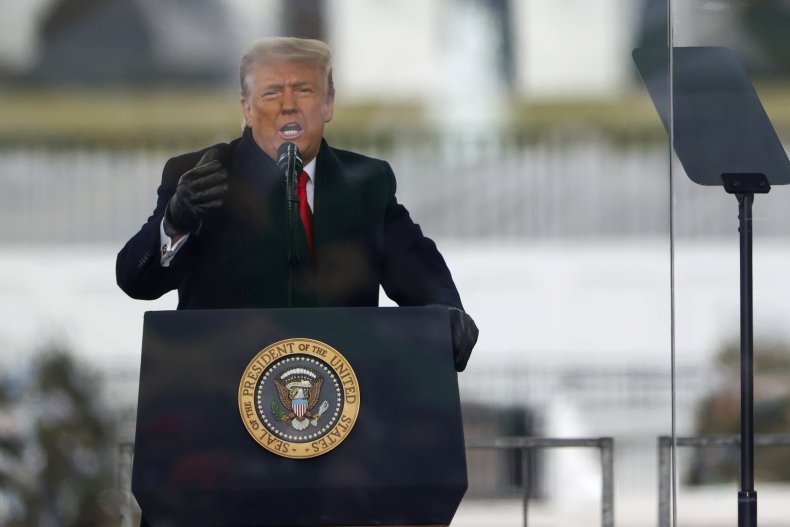[ad_1]
It would be nice if everyone had given their attention to how quickly Congress completed its work Wednesday. How, after a brief disruption, it counted the electoral ballots and confirmed President-elect Joe Biden and Vice President-elect Kamala Harris’s victory. That the norms were upheld and the victorious indeed emerged triumphant.
It would be nice—but it would ignore the elephant in the room.
Many regard the U.S. Capitol with the same kind of awe and reverence shown by Jimmy Stewart’s character in Mr. Smith Goes to Washington. I know I do and, after nearly 40 years of being intimately involved in the political process, I confess a great deal of earnest sentimentalism has managed to survive beneath my hard-shell journalistic cynicism.
The Capitol is an amazing building, unique for what it represents. To the world, its dome means freedom, liberty and equality. It stands for the idea every man and woman has an equal chance to succeed, unhampered by those factors that in other nations perpetuate class, caste and regional differences. We are, as a friend often reminds me, a great country full of amazing people who often do amazing things.
What happened Wednesday is an abomination. More than that, it sullies the very democratic institutions and processes those who came to protest the counting of the Electoral College ballots in what they believe is a stolen election said they had come to protect. Spontaneous or not, the assault on the Capitol was an affront to us all, Democrats, Republicans and independents alike—no matter who committed it.
As has been argued by others, President Donald J. Trump bears considerable responsibility for this madness. He sent those people off on a mission believing they were patriots standing up against the culmination of a corrupt process that denied him a second term. That is not, however, an indictment of the nearly 75 million Americans who voted for him in November.

Tasos Katopodis/Getty
Those who broke the law should be sought out and, if apprehended, punished to the full extent allowable by law. Those who entered the Capitol to ransack it not only made a mockery of the majesty and ritual with which America’s legislative process is conducted, they proved the Founding Fathers to have been correct in every way in which they warned against the dangers of the mob.
There is a coarseness in politics today that, for some time, has debased our democratic system. James Madison warned that partisanship would be problematic. We can see now how prescient he was. Disagreement and dissent are now too often presented as dishonorable, especially by the people on the other side of any given disagreement. The plain fact is there’s plenty of blame to go around, and the mob that attacked the Capitol were no more “patriots” than the assassins of the two New York City police officers murdered in 2014 while sitting in their cruiser were “civil rights activists.”
Words are the way we are supposed to settle things—not violence. That’s what my mother and father taught me and, I presume, it’s what most of you who are reading this now were also taught in your formative years. The disputes we have over the outcome of the 2020 presidential election, whether grounded in reality or a fantasy-fueled attempt to hang onto power, cannot and will not be settled by brawling or attacking democratic symbols.
As a new administration comes into office, hopefully both Democrats and Republicans will adopt a calmer approach to settling differences. The persistence of our democratic republic is a tribute to the vision of the Founders and the living legacy of men like Washington, Adams, Jefferson, Lincoln, the Roosevelts, Kennedy and Reagan—all of whom did so much to give it life. It is a tribute to them that our institutions and our democratic republic have not yet crumbled on account of the lesser lights who have been sometimes chosen to lead it.
However unfairly Mr. Trump was treated during his presidency, he must realize at some point that he brought many of these indignities upon himself. He chose to throw sharp elbows and should not have been surprised when they were thrown back. He could have left the presidency on a high note, confident he’d built a movement that would outlast him and that, in just four years, he’d successfully pushed policies leading to greater peace and prosperity (at least before COVID-19 hit). Ultimately, he surrendered to the lesser parts of our nature and seems, for the moment at least, to have destroyed any meaningful legacy he might have left.
Newsweek contributing editor Peter Roff has written extensively about politics and the American experience for U.S. News and World Report, United Press International and other publications. He can be reached by email at RoffColumns@GMAIL.com. Follow him on Twitter: @PeterRoff.
The views expressed in this article are the writer’s own.
[ad_2]
Source link